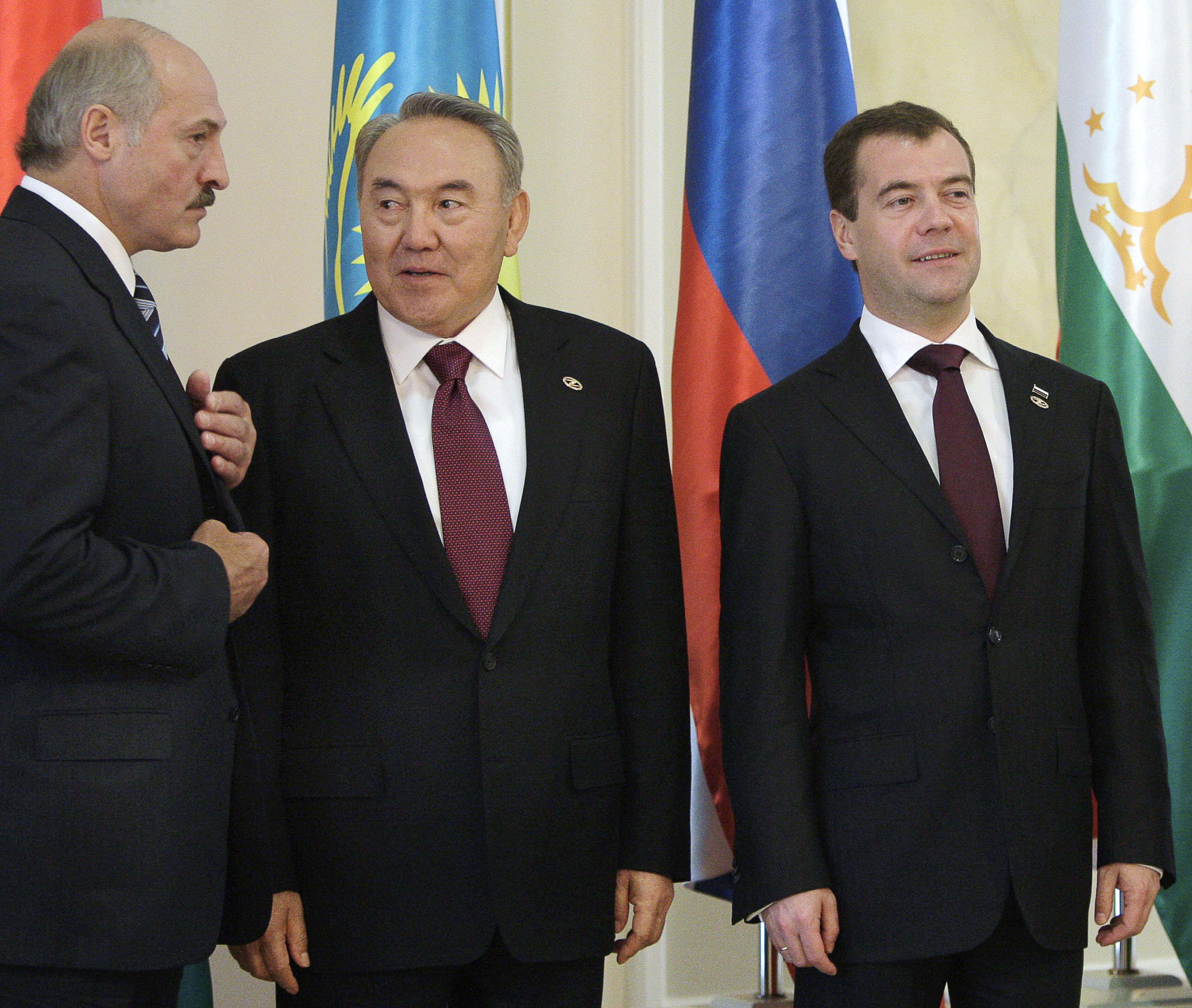
Kazakhstan’s Uncertain Future in the Customs Union
Publication: Eurasia Daily Monitor Volume: 7 Issue: 158
By:

On July 1, the Customs Union between Kazakhstan, Russia and Belarus formally came into force. However, the occasion produced no cause for celebration among the members of the Customs Union. The reasons for such open pessimism over the future of this organization are becoming evident, as Minsk and Moscow increasingly resort to unfriendly language in their fruitless efforts to overcome the deepening differences on vital issues. In Kazakhstan, public events staged by nationalist forces against alliance with Slavic states, above all, Russia, are becoming frequent.
Moderate observers, and even among the largely pro-Moscow opposition ranks in Astana, express doubts about the future of the Kazakh-Russian tandem within the newly formed Customs Union without the fully-fledged participation of Belarus in this organization. In this atmosphere of hostility towards the Customs Union, Yermukhanbet Yertisbayev, a former advisor to President, Nursultan Nazarbayev, boasted that Kazakhstan and Russia were successfully moving along an integration course towards the restoration of the Soviet Union (Zhas Alash, July15).
Many observers in Kazakhstan fear that Moscow’s primary goal in its integration policy is the resurrection of the Russian-dominated union within the CIS space. Yet, the main stumbling block in the path of Russian-led economic and political integration in the CIS seems to be the stance adopted by the Belarusian President, Alyaksandr Lukashenka. The Kazakh media has speculated on whether the Russian Prime Minister, Vladimir Putin, and Lukashenka will drive the last nail into the coffin of the Customs Union, or if Minsk might join the EU in the future. Neither of these eventualities bode well for Kazakhstan in its quest to access European energy markets via Russia and Belarus, which was the only plausible explanation for Kazakhstan joining the doubtful alliance. However, as long as Russia and Belarus remain divided, the Customs Union will be fragile. The gas war which erupted between Belarus and Russia last July, and the possibility of Minsk demanding financial concessions from Moscow for Russian military bases stationed in Belarus poses risks for the durability of the Customs Union. Therefore, Astana is likely to await the outcome of the standoff between Moscow and Minsk before committing itself fully to the organization (Delovaya Nedelia, July 23).
In every respect, the Customs Union represents an unequal forced marriage motivated by Moscow’s ambition to regain its former influence in the CIS. However, it can hardly be expected that any other state in the CIS will rush to join the Customs Union. Economists forecast that if the current Customs Union code remains in force, by 2015 Russia’s budget will receive $400 billion, while Kazakhstan and Belarus will share $32 billion equally. Currently, the bilateral trade turnover between Kazakhstan and Russia barely equals $15 billion, and in five years after the creation of the Customs Union, the trade volume is only expected to triple (Delovaya Nedelia, July 23).
The future of the Customs Union is the dominant theme within government circles in Kazakhstan. Prime Minister, Karim Masimov, led a widespread propaganda campaign dispatching government ministers to remote regions of the country to convince the population of the benefits of the Customs Union for Kazakhstan. The prevailing view, however, is that Kazakhstan, with its immense territory rich in mineral and energy resources, but poorly developed industry and vast agricultural regions, will be destined to remain a raw materials supplier for the Russian economy within the Customs Union. The only area in which Kazakhstan could possibly successfully compete with Russia is its relatively modernized agricultural sector. The Russian ministry of agriculture recently announced a wheat harvest of 85 million tons this year, much less than an earlier forecast of 97 million tons, which has now been affected by high temperatures and forest fires over the summer and a ban on grain exports. Poor harvest from wheat-growing regions hit by severe drought, will also reduce Russian grain exports next year, once they resume. Despite the unusually scarce rainfall, Kazakhstan expects to gather 15 million tons of grain this year adding to the 7 million tons of wheat from last year’s harvest in storage (Panorama, July 23).
Moscow still possesses considerable economic leverage to exert pressure on Astana and Minsk, utilizing Kazakhstan’s dependence on Russian transit routes for access to European energy markets. Belarus is heavily reliant upon Russian subsidies to prop up its fragile economy. Nevertheless, allowing predatory Russian oligarchs into the Belarusian economy is highly unlikely while Lukashenka remains in power. These apparent contradictions will likely elongate the timescale for creating a genuine Customs Union.




